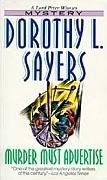— Love @ 13:26 Comments (5)
Filed under: A, Decades '08, English, Historical, Mystery
 Murder Must Advertise
Murder Must Advertise
by Dorothy L Sayers

For the Decades ’08 reading challenge (first published 1933).
English
356 pages
Harper Mystery
ISBN: 978-0-06-104355-0
First line: “And by the way,” said Mr. Hankin, arresting Miss Rossiter as she rose to go, “there is a new copy-writer coming in today.”
Back cover blurb:
When ad man Victor Dean falls down the stairs in the offices of Pym’s Publicity, a respectable London advertising agency, it looks like an accident. Then Lord Peter Wimsey is called in, and he soon discovers there’s more to copywriting than meets the eye. A bit of cocaine, a hint of blackmail, and some wanton women can be read between the lines. And then there is the brutal succession of murders—five of them—each one a fixed fee for advertising a deadly secret.
Thoughts: I think I might have mentioned it before, but just in case I haven’t, I feel I should state, for the record, that Murder Must Advertise is my favourite Wimsey book. It is also the first Wimsey book I ever read and the one I’ve read the most times. This was the first opportunity I had to read it in English, though, so it was a little bit like coming to it for the first time.
Wimsey is, as always, simply marvellous, and Parker still deserves his spot as my second favourite. Bunter, due to the nature of the story, does not make many appearances (if any at all. I’m afraid my memory’s a bit like a sieve), which is a bit of a pity, as I like him quite a bit as well and his and Wimsey’s working relationship is always a pleasure to read about.
Add to that the insight you get into the world of advertising (I believe Sayers herself worked in advertising at one point). It’s true that it’s the world of advertising in the 1930s, and if anything, things are probably even crazier these days, but there are a few passages in the book where Wimsey ponders the effects of advertising on people, and I think the questions he poses are still well worth asking.
Where, Bredon asked himself, did the money come from that was to be spent so variously and so lavishly? If this hell’s-dance of spending and saving were to stop for a moment, what would happen? If all the advertising in the world were to shut down tomorrow, would people still go on buying more soap, eating more apples, giving their children more vitamins, roughage, milk, olive oil, scooters and laxatives, learning more languages by gramophone, hearing more virtuosos by radio, re-decorating their houses, refreshing themselves with more non-alcoholic thirst-quenchers, cooking more new, appetizing dishes, affording themselves that little extra touch which means so much? Or would the whole desperate whirligig slow down, and the exhausted public relapse upon plain grub and elbow-grease?
I especially love the last two paragraphs of the book. They don’t at all deal with the story, so I could technically quote them here without terribly spoiling anyone, but I’m not going to. You will have to read the book yourselves (or at least look at the last page), to understand what I’m talking about. Perhaps you won’t even like them, but I do. A lot.
Instead, I shall proceed to quote a few other passages of the book. There is one in particular that I wish I could quote, because I laughed out loud at it, but unfortunately it isn’t funny unless you’ve read certain other bits of the story, so I won’t bother about it after all.
“And if I were you,” continued Garrett, “I wouldn’t mention Dean to Willis at all. There’s some kind of feeling—I don’t know quite what. Anyway, just thought I’d warn you.”
Bredon thanked him with an almost passionate gratitude.
“It’s so easy to put your foot in it in a new place, isn’t it? I’m really most frightfully obliged to you.”
Clearly Mr. Bredon was a man of no sensibility, for half an hour later he was in Willis’s room, and had introduced the subject of the late Victor Dean.
“You look as though you’d been shining up a pipe.”
“Well, I did shin down a pipe. Only one pipe—rather a nice pipe. It took my fancy.”
“Your narrative style,” said Parker, “though racy, is a little elliptical. Could you not begin at the beginning and go until you come to the end, and then, if you are able to, stop?”
To end this so-called review, I had better give the novel its rating. If you were expecting anything other than an A, I am afraid you are much mistaken, as an A it is. And if I know you well and you have not yet read this book, then you can rest assured that I will attempt to make you read it, if it’s the last thing I do. So there.

21 Feb 2008 at 23:47
I love this one too-although Gaudy Night ranks so high for me as well, I can’t choose between them. This is the one with the awesome cricket scene, right? I swear, it singlehandedly explained that game to me. :D
24 Feb 2008 at 14:09
I love the cricket scene. It’s one of the best in the book.
I’m getting ’round to Gaudy Night soon, but really, I just love all these books.
24 Feb 2008 at 18:32
You’ve never read Gaudy Night? Lord Peter isn’t really in it all that much, but it’s a great one for Harriet.
24 Feb 2008 at 20:22
No, I’ve read it before. I meant that I’m getting ’round to my re-read of it soon. I’m working on re-reading them all, or at least most of them, this year.
2 Mar 2008 at 19:39
[…] Murder Must Advertise; Dorothy L Sayers, B […]